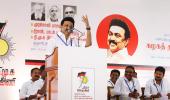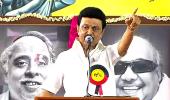For now, the DMK can be expected to sound the bugle for Opposition unity at the national level, predicts N Sathiya Moorthy.

On paper, Tamil Nadu's DMK Chief Minister M K Stalin could not have hoped for a better birthday gift.
A day after he turned 70, and which party men celebrated by gifting him a camel and goat, among others, they handed him a gift that he cannot forget.
Without grumbling and putting in a lot of sweat, blood and much more money, DMK ministers, MLAs, district secretaries and cadres from across the state gave him a memorable by-election victory in the Erode East assembly constituency in the rival AIADMK's traditional western stronghold.
The victory becomes memorable even more for the victorious candidate, septuagenarian E V K S Elangovan, who is at the fag end of his political career, having been an MLA, MP and Union minister in the past.
What makes it memorable for both Stalin and Elangovan is the fact that the victor belongs not to the chief minister's DMK, but to the Congress ally, which would not have stood a remote chance without the kind of commitment and support visible all across the constituency almost from the word 'Go'.
And Stalin sounded the word 'Go' even without the Congress asking him, both for allotting the seat to the party under the 2021 alliance for the assembly polls that returned the DMK to power after the 2011 rout and the 2016 defeat five years later.
And Stalin said so almost after the incumbent Congress legislator, E Thirumagan Evera, 46, died of a cardiac arrest in the first week of January.
Better still, even though Elangovan was clear that he did not want to contest but the seat be allotted to his second son (a novice in politics?), the high command almost thrust it upon him.
There was no going back, not just for Elangovan but even more for the DMK ministers and MLAs who made it their personal fight for the victory to be submitted to Stalin.
The kind of money and gifts that reportedly flowed across the constituency, adding up to tens of crores of rupees, definitely did not come from the non-existent coffers of Elangovan or his cash-strapped state party -- and even more so for his losing rival, K S Thennarasu of the AIADMK.
So, when the DMK ministers made it into a DMK-AIADMK battle, the local media has all but been referring to Elangovan's Congress victory as that of the 'DMK front', without actually saying it is that of the DMK and DMK alone.
But the defeat, to them all, is that of the AIADMK, especially that of former chief minister Edappadi K Palaniswami (EPS), who actually had a better team on the ground than the powers that the DMK rivals wielded -- and spent from their past 'savings' on a lesser-known ex-MLA, K S Thennarasu.
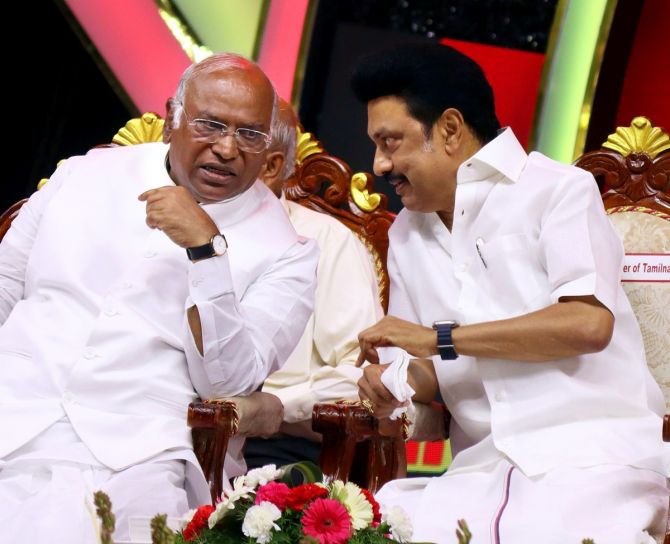
Today, when DMK cadres and second-line leaders are euphoric over Elangovan's huge victory margin with a high number of 75 other candidates losing their deposit, the question is if it wasn't a Pyrrhic victory instead.
The same applies to the AIADMK camp, where EPS had made bagging the party's 'Two Leaves' symbol for its nominee, against contestations by the rival faction led by three-time chief minister O Panneerselvam, was the be-all and end-all of the by-election. The reasons are not far to seek.
For the right and wrong reasons, the by-election, coming as it did close to two years after Stalin came to power, came to be seen as a referendum on his government's performance and consequent acceptance, that too, a year ahead of the Lok Sabha polls.
Yet, such a massive victory for the DMK-led alliance does not automatically translate into a sweeping victory for them in the Lok Sabha polls, as they did in the previous 2019 outing.
At the time, only Elangovan as the 'outsider' Congress candidate imposed on the unfamiliar hilly Theni constituency, lost, incidentally to the AIADMK's P Raveendranath Kumar, OPS's son, by 75,000 votes.
Barring the VCK's Thol Thirumavalavan in the Cuddalore (Reserved) constituency, DMK alliance candidates swept all but Theni with a 38-1 tally; each Lok Sabha seat won by margins in lakhs of votes.
This is the kind of victory that is very hard for the alliance to repeat, mainly because of the inevitability of anti-incumbency that hangs onto Stalin's coat-tails just now.
It is not going to be easy for him to shrug it, either by over-awing the voters with the Hindutva bogey as in 2019, nor by living up to the voters' expectations, his campaign for the subsequent assembly polls promising everything to everyone without being specific about anything to anyone.
It is not just about the unkept promises from the 2021 poll, which list, of course, is long.
Still living in the past like the Congress ally at the national level, the DMK has not been able to counter the social media attacks by both the AIADMK and its ruling BJP ally at the Centre, especially after two campaign strategists, including the hugely successful Prashant Kishor, left after their tenure.
Over and above this, old warhorses of the party, little alive to the social media era in which they are living, have been doing and saying things on camera that have become hugely embarrassing for the leadership.
The party has done nothing to wipe out the cumulative effect of such accumulated negativism that is slowly but surely seeping into the voters's mind-set, all across.

If there is still something that may not impact the state's voters too much in the Lok Sabha polls, it is the money-play in Erode East.
Those that are traditionally opposed to the DMK, for so-called ideological reasons, especially among the elitist classes, alone cry foul as if this was a new thing. Their votes do not ordinarily belong to the party.
There is the other segment, namely, the lower and lower-middle class voters, who have got used to the 'cash-for-vote' and 'vote-for-cash' phenomenon ever since the ruling AIADMK under then chief minister J Jayalalithaa introduced it big-time in by-elections since her first term (1991-1996). The DMK followed suit.
Today, even non-serious contenders, especially of lesser political parties, are afraid of complaining to the Election Commission or whoever as the voter pounces on them for denying them the money 'someone is willing to give us'.
This has meant competitive pocket-filling of voters, where the ruling party gives more and the Opposition, less, but much more than a token amount.
This in turn has led to a situation that the ruling party has invariably won most by-elections, whoever is in power, since Jayalalithaa's first term as chief minister.
Yet, the advantage for the DMK-Congress alliance is this.
The minorities continue to vote against the AIADMK because of its alliance with the BJP.
Under the circumstances involving the party split and symbol, the EPS faction could not afford to distance itself from the BJP in the by-election, but their main leaders did maintain a 'safe distance' by deliberately avoiding joint election campaigns.
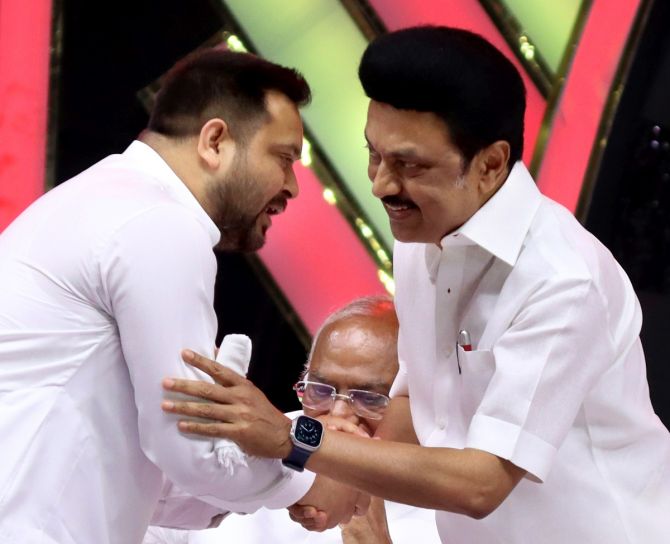
The reasons are not far to seek.
Unlike often mis-represented by sections of the local media, the Mudaliar community, followed by the minorities (mainly Muslims), dominate the constituency. They are followed by the Arundathiyar scheduled caste community.
In the fourth rung is the Vellalar Gounder community, with which the AIADMK is mostly identified in the western region and to which EPS and most of his lieutenants in the AIADMK politics belong.
That is to say, even without big money, the DMK alliance stood a fair chance, given the committed votes of the party and the expected votes of the anti-BJP minorities, as happened in the 2019 Lok Sabha polls.
Not that BJP state president, the inimitable ex-cop Kuppusamy Annamalai is doing anything to spread the message.
While he may be getting the maximum media coverage (possibly surpassing Stalin on days and in weeks), his message convinces only the 'already converted'.
He does not seem to have been able to bring in new and more votes to the party, just as his two predecessors, Union Minister L Murugan and Telangana Governor Tamizhisai Soundararajan.
Between them, Annamalai and state Governor Ravindra Narayana Ravi have successfully kept the 'Tamizhar than-manam' (Tamil self-esteem and pride) alive as a politico-electoral campaign point that has already seeped into bones and marrows.
Without them, the AIADMK, even under the less charismatic EPS (compared to party founder MGR and his nominated successor Jayalalithaa), had a level playing field in issues of Hindutva and Centre-state relations, which are still defining pointers in elections in Tamil Nadu.
The question is if and how the EPS faction is able to shrug off the BJP in the Lok Sabha polls (with an unwritten promise of re-joining the NDA, post-poll).
In such a scenario, the BJP too stands to win a few Lok Sabha seats, in a three-cornered contest (leaving out smaller parties). Or, at least that is the perception.
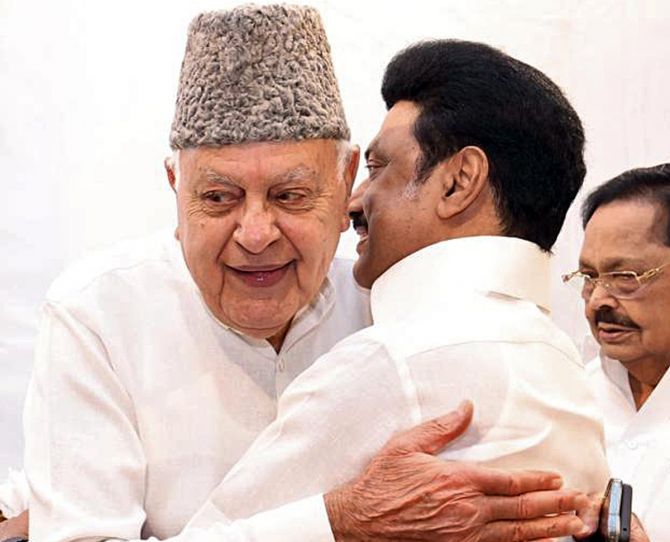
For now, the DMK can be expected to sound the bugle for Opposition unity at the national level, taking off from where Stalin left at the public rally on his birthday. Present on the dais were Congress President Mallikharjun Kharge, J&K's Farooq Abdullah, UP's Akhilesh Yadav and Bihar's Tejashwi Yadav.
Conspicuous by their absence were Delhi's Arvind Kejriwal, West Bengal's Mamata Banerjee and Telangana's K Chandrashekar Rao -- all of them prime ministerial aspirants.
Also missing were Sharad Pawar (and/or his daughter Supriya Sule) and a representative from the Shiv Sena (from the Uddhav Thackeray faction, that is).
At the Chennai rally, Stalin pooh-poohed ideas of a third front and also post-poll alliances, declaring that there can be no national level alliance against the BJP without the Congress [arty.
What was not missed was Kharge's follow-up on the Raipur declaration last week, calling for Opposition unity, with a new clarification that the party would not insist on any prime ministerial candidate -- meaning, Rahul Gandhi -- just now.
N Sathiya Moorthy, veteran journalist and author, is a Chennai-based policy analyst and political commentator.
Feature Presentation: Rajesh Alva/Rediff.com


